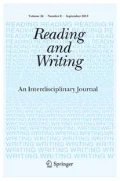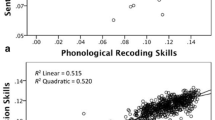Abstract
Spanish-speaking learners of French, aged 9 to 11 years old, were tested after approximately 7months of French instruction to explore the contribution of phonological and syntactic awareness in L2 in 4 components of L2 reading, taking oral competence in L2 andreading in L1 into account. Phonological tasksin L2 better explain decoding. Word recognitionthrough the visual route is best explained bythe corresponding ability in L1. Sentencecomprehension is best explained by oralcompetence in L2, although it is stronglycorrelated with syntactic awareness. Finally,text comprehension is explained by thecorresponding ability in L1, althoughcorrelations with syntactic awareness and oralcompetence are strong. Theoretical implicationsare derived from these findings, and questionsrelative to the subjects' age and level ofbilingualism as well as methodological issuesare discussed.
Similar content being viewed by others
References
Armand, F. (2000). FrLe rôle des capacités métalinguistiques et de la compétence langagière orale dans l’apprentissage de la lecture en français langue première et seconde. [The role of metalinguistic capacities and oral competence in learning to read in French L1 and L2.] Canadian Modern Language Review 56, 471‐497.
Bernhardt, E.B. & Kamil, M.L. (1995). Interpreting relationships between L1 and L2 reading: Consolidating the linguistic threshold and the linguistic interdependence hypotheses. Applied Linguistics 16, 15‐34.
Bialystok, E. (1988). Aspects of linguistic awareness in reading comprehension. Applied Psycholinguistics 9, 123‐139.
Bialystok, E. (1991). Metalinguistic dimensions of bilingual language proficiency. In: E. Bialystok (Ed.), Language processing in bilingual children (pp. 113‐140). Cambridge: Cambridge University Press.
Blackmore, A.M. & Pratt, C. (1997). Grammatical awareness and reading in grade 1 children. Merrill-Palmer Quarterly 43, 567‐590.
Caravolas, M. & Bruck, M. (1993). The effect of oral and written language input on children’s phonological awareness: A cross-linguistic study. Journal of Experimental Child Psychology 55, 1‐30.
Carlisle, J.F. (1995). Morphological awareness and early reading achievement. In: L.B. Feldman (Ed.), Morphological aspects of language processing (pp. 189‐209). Hillsdale, New Jersey: Lawrence Erlbaum.
Carr, T.H., Brown, T.L., Vavrus, L.G. & Evans, M.A. (1990). Cognitive skill maps and cognitive skill profiles: Componential analysis of individual differences in children’s reading efficiency. In: T.H. Carr & B.A. Levy (Eds.), Reading and its development: Component skills approaches (pp. 1‐55). San Diego, California: Academic Press.
Carrillo, M. (1994). Development of phonological awareness and reading acquisition. Reading and Writing: An Interdisciplinary Journal 6, 279‐298.
Carrow-Woolfolk, E. (1985). Test for auditory comprehension of language (TACL-R Test Book revised edition). Allen, Texas: DLM Teaching Resources.
Catts, H.W., Fey, M.E., Zhang, X. & Tomblin, J.B. (1999). Language basis of reading and reading disabilities: Evidence from a longitudinal investigation. Scientific Studies of Reading 3, 331‐361.
Chiappe, P. & Siegel, L.S. (1999). Phonological awareness and reading acquisition in Englishand Punjabi-speaking Canadian children. Journal of Educational Psychology 91, 20‐28.
Cisero, C.A. & Royer, J.M. (1995). The development and cross-language transfer of phonological awareness. Contemporary Educational Psychology 20, 275‐303.
Coltheart, M. (1978). Lexical access in simple reading tasks. In: G. Underwood (Ed.), Strategies of information processing (pp. 151‐216). London: Academic Press.
Comeau, L., Cormier, P., Grandmaison, É. & Lacroix, D. (1999). A longitudinal study of phonological processing skills in children learning to read in a second language. Journal of Educational Psychology 91, 29‐43.
Cormier, P. & Kelson, S. (2000). The roles of phonological and syntactic awareness in the use of plural morphemes among children in French immersion. Scientific Studies of Reading 4, 267‐293.
Cossu, G., Shankweiler, D., Liberman, I.Y., Katz, L. & Tola, G. (1988). Awareness of phonological segments and reading ability in Italian children. Applied Psycholinguistics 9, 1‐16.
Cunningham, P. (1990). The names test: A quick assessment of decoding ability. The Reading Teacher 44, 124‐129.
Cupples, L.& Holmes, V.M. (1992). Evidence for a difference in syntactic knowledge between skilled and less skilled adult readers. Journal of Psycholinguistic Research 21, 249‐274.
Demont, É. (1994). Conscience phonologique, conscience syntaxique: quel(s) rôle(s) dans l’apprentissage efficace de la lecture? [Phonological, syntactic awareness: What role(s) in learning to read efficiently?] In: J. Grégoire & B. Piérart (Eds.), Évaluer les troubles de la lecture [Assessing reading disorders] (pp. 195‐208). Brussels: De Boeck Université.
Demont, É. & Gombert, J.-É. (1996). Phonological awareness as a predictor of recoding skills and syntactic awareness as a predictor of comprehension skills. British Journal of Educational Psychology 66, 315‐332.
Denhière, G. (1983). Il était une fois.... [Once upon a time....] Lille: Presses universitaires de Lille.
Deutsch, A. & Bentin, S. (1996). Attention factors mediating syntactic deficiency in readingdisabled children. Journal of Experimental Child Psychology 63, 386‐415.
Durguno?lu, A.Y. & Hancin, B.J. (1992). An overview of cross-language transfer in bilingual reading. In: R.J. Harris (Ed.), Cognitive processing in bilinguals (pp. 391‐411) Amsterdam: Elsevier Science Publishers.
Durguno?lu, A.Y. & Öney, B. (1999). A cross-linguistic comparison of phonological awareness and word recognition. Reading and Writing: An Interdisciplinary Journal 11, 281‐299.
Durguno?lu, A.Y., Nagy, W.E. & Hancin-Bhatt, B.J. (1993). Cross-language transfer of phonological awareness. Journal of Educational Psychology 85, 453‐465.
Fayol, M. (1992). Comprendre ce qu’on lit: de l’automatisme au contrôle. [Understanding what we read: from automatism to control.] In: M. Fayol, J.-É. Gombert, P. Lecocq, L. Sprenger-Charolles & D. Zagar (Eds.), Psychologie cognitive de la lecture [Cognitive psychology of reading] (pp. 73‐105). Paris: P.U.F.
Fitzgerald, J. (1995). English-as-a-second-language learners’ cognitive reading processes: A review of research in the United States. Review of Educational Research 65, 145‐190.
Frost, R., Katz, L. & Bentin, S. (1987). Strategies for visual word recognition and orthographical depth: A multilingual comparison. Journal of Experimental Psychology: Human Perception and Performance 13, 104‐115.
Galambos, S.J. & Hakuta, K. (1988). Subject-specific and task-specific characteristics of metalinguistic awareness in bilingual children. Applied Psycholinguistics 9, 141‐162.
Gaux, C. (1996). Liens entre maîtrises phonologique et morpho-syntaxique orales et niveaux de lecture chez les préadolescents. [Links between oral phonological and morphosyntactic competences and reading levels with preadolescents.] Unpublished doctoral thesis. Dijon: Université de Bourgogne.
Gaux, C.& Gombert, J.-É. (1999). La conscience syntaxique chez les préadolescents: question de méthodes. [Syntactic awareness in preadolescents: methodological issues.] L’Année psychologique [Psychological Year] 99, 45‐74.
Gombert, J.-É. (1992a). Activités de lecture et activités associées. [Reading activities and related activities.] In: M. Fayol, J.-É. Gombert, P. Lecocq, L. Sprenger-Charolles & D. Zagar (Eds.), Psychologie cognitive de la lecture [Cognitive psychology of reading] (pp. 107‐140). Paris: P.U.F.
Gombert, J.-É. (1992b). Metalinguistic development. New York: Harvester-Wheatsheaf/ Chicago: University of Chicago Press.
Gombert, J.-É. & Colé, P. (2000). Activités métalinguistiques, lecture et illettrisme. [Metalinguistic activities, reading and illiteracy.] In: M. Kail & M. Fayol (Eds.), L’acquisition du langage [Language acquisition], Vol. 2 (pp. 117‐150). Paris: P.U.F.
Gombert, J.-É., Gaux, C. & Demont, É. (1994). Capacités métalinguistiques et lecture. Quels liens? [Metalinguistic capacities and reading.What links?] Repères [Landmarks] 9, 61‐73.
González, J.E.J. & García, C.R.H. (1995). Effects of word linguistic properties on phonological awareness in Spanish children. Journal of Educational Psychology 87, 193‐201.
Gottardo, A., Stanovich, K.E. & Siegel, L.S. (1996). The relationships between phonological sensitivity, syntactic processing, and verbal working memory in the reading performance of third-grade children. Journal of Experimental Child Psychology 63, 563‐582.
Juel, C., Griffith, P.L. & Gough, P.B. (1986). Acquisition of literacy: A longitudinal study of children in first and second grade. Journal of Educational Psychology 78, 243‐255.
Khomsi, A. (1990). Épreuve d’évaluation de la compétence en lecture ‐ LMC. [Reading proficiency assessment test.] Paris: Éditions du C.P.A.
Kintsch, W. & van Dijk, T.A. (1978). Toward a model of text comprehension and production. Psychological Review 85, 363‐385.
Koda, K. (1994). Second language reading research: Problems and possibilities. Applied Psycholinguistics 15, 1‐28.
Kozminsky, L. & Kozminsky, E. (1995). The effects of early phonological awareness training on reading success. Learning and Instruction 5, 187‐201.
Lecocq, P. (1991). Apprentissage de la lecture et dyslexie. [Learning to read and dyslexia.] Brussels: Mardaga.
Levy, B.A.& Carr, T.H. (1990). Component process analyses: Conclusions and challenges. In: T.H. Carr & B.A. Levy (Eds.), Reading and its development: Component skills approaches (pp. 423‐438). San Diego, California: Academic Press.
Mélançon, J. & Ziarko, H. (1999). De la maternelle à la première année: évolution des habiletés métalinguistiques et compréhension de l’écrit. [From kindergarten to grade one: evolution of metalinguistic abilities and written comprehension.] The Canadian Journal of Research in Early Childhood Education 8: 37‐58.
Morais, J., Alegria, J. & Content, A. (1987). The relationships between segmental analysis and alphabetical literacy: An interactive view. European Bulletin of Cognitive Psychology 7, 415‐438.
Raven, J.C., Court, J.H. & Raven, J. (1996). Manual for Raven’s progressive matrices and vocabulary scales: Section 3. Oxford: Oxford Psychologists Press.
Schell, L.M. (1988). Dilemmas in assessing reading comprehension. The Reading Teacher 42, 12‐16.
Schneider, W. & Näslund, J.C. (1993). The impact of early metalinguistic competencies and memory capacity on reading and spelling in elementary school: Results of the Munich longitudinal study on the genesis of individual competencies (LOGIC). European Journal of Psychology of Education 8, 273‐287.
Schneider, W., Küspert, P., Roth, E., Visé, M. & Marx, H. (1997). Short-and long-term effects of training phonological awareness in kindergarten: Evidence from two German studies. Journal of Experimental Child Psychology 66, 311‐340.
Segalowitz, N., Poulsen, C. & Komoda, M. (1991). Lower level components of reading skill in higher level bilinguals: Implications for reading instruction. AILA Review 8, 15‐30.
Shankweiler, D., Crain, S., Katz, L., Fowler, A.E., Liberman, A.M., Brady, S.A. et al. (1995). Cognitive profiles of reading-disabled children: Comparison of language skills in phonology, morphology, and syntax. Psychological Science 6, 149‐156.
Signorini, A. (1997). Word reading in Spanish: A comparison between skilled and less skilled beginning readers. Applied Psycholinguistics 18, 319‐344.
Snow, C.E., Tabors, P.O., Nicholson, P.A. & Kurland, B.F. (1995). SHELL: Oral language and early literacy skills in kindergarten and first-grade children. Journal of Research in Childhood Education 10, 37‐48.
Swanson, H.L. & Alexander, J.E. (1997). Cognitive processes as predictors of word recognition and reading comprehension in learning-disabled and skilled readers: Revisiting the specificity hypothesis. Journal of Educational Psychology 89, 128‐158.
Tunmer, W.E., Herriman, M.L. & Nesdale, A.R. (1988). Metalinguistic abilities and beginning reading. Reading Research Quarterly 23, 135‐158.
Tunmer, W.E., Nesdale, A.R. & Wright, A.D. (1987). Syntactic awareness and reading acquisition. British Journal of Developmental Psychology 5, 25‐34.
Verhoeven, L.T. (1987). Literacy in a second language context: Teaching immigrant children to read. Educational Review 39, 245‐261.
Verhoeven, L.T. (1990). Acquisition of reading in a second language. Reading Research Quarterly 25, 90‐114.
Vygotsky, L.S. (1986). Thought and language (translated by A. Kozulin). Cambridge, MA: MIT Press. (Original work published in 1934.)
Wagner, R.K., Torgesen, J.K., Rashotte, C.A., Hecht, S.A., Barker, T.A., Burgess et al. (1997). Changing relations between phonological processing abilities and word-level reading as children develop from beginning to skilled readers: A 5-year longitudinal study. Developmental Psychology 33, 468‐479.
Yopp, H.K. (1988). The validity and reliability of phonemic awareness tests. Reading Research Quarterly 23, 159‐177.
Author information
Authors and Affiliations
Rights and permissions
About this article
Cite this article
Lefrançois, P., Armand, F. The role of phonological and syntactic awareness in second-language reading: The case of Spanish-speaking learners of French. Reading and Writing 16, 219–246 (2003). https://doi.org/10.1023/A:1022874425314
Issue Date:
DOI: https://doi.org/10.1023/A:1022874425314




